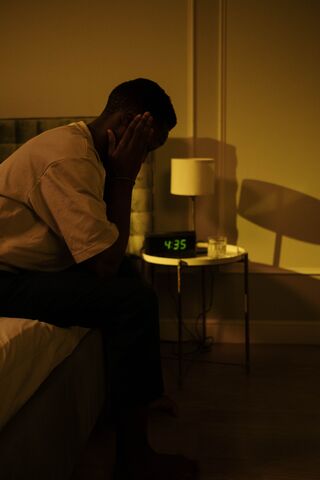Sleep
The Link Between Sleep and Mental Illness
Mental health relies on quality rest, new research confirms.
Posted October 16, 2021 Reviewed by Lybi Ma
Key points
- Poor sleep quality (rather than total sleep duration) was shown to predict poor mental health outcomes in nearly 90,000 subjects.
- Improving sleep can help prevent and treat mental illnesses.
- Screening for sleep disturbances could help detect mental illnesses earlier in their onset.

A good night’s sleep can do wonders for well-being. Folks who report being well-rested exhibit better cognitive functioning (the ability to focus, learn new information, and retrieve knowledge from memory), self-control, lower anxiety, higher pain tolerance, and healthier blood pressure levels than folks who report disturbed sleep. Sleep disturbances also simultaneously contribute to mental illnesses (ranging from generalized anxiety disorder and depression to bipolar disorder and schizophrenia) while also being hallmarks of them.
Most studies examining sleep’s relationship with mental illness, however, ask participants to self-report how good or poor their nightly Z’s are. Wanting to gain a more definitive look at the link between sleep quality and mental health, a team of researchers led by Michael Wainberg, of Toronto, Canada’s Centre for Addiction and Mental Health, tracked the sleep activity of 89,205 individuals by outfitting them with an accelerometer that measured their movements during the day and evening and correlated this data with participants’ histories of inpatient psychiatric admissions for depression, anxiety, schizophrenia, and bipolar disorder as well as their genetic risks for various mental health issues. Data on psychiatric admissions and genetic risk were culled from the UK Biobank, a database containing hundreds of thousands of individuals’ genetic and behavioral information.
The Study
Wainberg et al.’s results, published in a recent edition of PLOS MEDICINE, found that accelerometer-derived sleep measures (which included bedtime and wake-up times, duration of sleep, and the number of times waking after falling asleep) significantly predicted participants’ psychiatric inpatient histories as well as their genetic risks of mental illness. More specifically, Wainberg’s team found that it wasn’t so much total sleep duration that predicted participants’ mental illness risk but rather the quality of the sleep they got during the time they were in bed: Participants whose accelerometers revealed that they woke more often after falling asleep and remained asleep for shorter bouts between bedtime and wake-up time were more likely to have met the criteria for a mental illness within their lifetime—and to be genetically predisposed to mental illness.
Why Do Sleep Disturbances and Mental Illness Go Hand in Hand?
There are several reasons why sleep disturbances may be linked with impoverished mental health. When we sleep, we generate new neural connections—a process called neurogenesis—particularly in a region of our brain associated with memory, mood, and emotion called the hippocampus. Inadequate sleep impairs neurogenesis, and impaired neurogenesis in the hippocampus has been found to contribute to depression as well as schizophrenia and drug addiction.

Insomnia and mental illness may also share a common underlying genetic predisposition: The same sets of genes that increase one's risk of anxiety, depression, schizophrenia, and bipolar disorder may also increase one's risk of poor sleep. Mental illness and insomnia may also arise from a person's trauma history. It is well known that trauma—especially childhood trauma—predicts a host of poor mental (and physical) health outcomes, including insomnia. Trauma dysregulates our arousal systems, leaving us more hyper-vigilant and thus less able to sleep peacefully and soundly (and more likely to have nightmares). Trauma also increases system-wide inflammation, which has been associated with various mental illnesses including bipolar disorder, schizophrenia, generalized anxiety disorder, and depression.
What This Means for Us
Not everyone who struggles with insomnia is destined to struggle with mental illness. But chronic sleep disturbances can and do give rise to impaired mental health, not to mention impaired interpersonal functioning and physical health. Even among individuals who do not meet the criteria for a mental illness, poor sleep quality is linked to increased psychological distress and relentlessly sleepless nights are found to nearly double one's risk of depression and markedly raise one's risk of future anxiety disorders. Getting adequate rest is critical to a healthy mind and body.
As the researchers note, “sleep problems are both symptoms of and modifiable risk factors for many psychiatric disorders.” Up to 20 percent of all adults in Western countries are estimated to struggle with insomnia. Strategies to improve sleep (think: psychopharmacological interventions, cognitive-behavioral therapies, noninvasive brain stimulation, and general sleep hygiene interventions—like reducing caffeine and alcohol consumption, keeping lights dim, and avoiding screens an hour before bedtime) should be more routinely used to help treat and prevent mental illnesses. Additionally, mental illnesses may be more effectively detected at earlier stages by regular sleep quality screenings—say, at annual primary care physician assessments or even at each visit to an emergency room or urgent care center.
If you struggle with insomnia, talk to your doctor about treatment options, or consider downloading the CBTi Coach app (developed by Stanford University researchers in collaboration with the U.S. Department of Veterans Affairs to help treat PTSD symptoms, including insomnia) that uses evidence-based cognitive-behavioral techniques to improve sleep quality and duration. And don't forget to check out this website's excellent therapist directory to get support with any psychological issue you may be up against that could be contributing to sleepless nights.
LinkedIn and Facebook image: amenic181/Shutterstock


